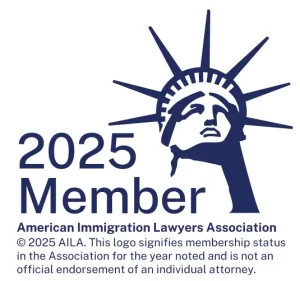Bottom Line Up Front: One lie on your I-485 adjustment of status application—even about something that wouldn’t have disqualified you—can result in the permanent loss of your green card and deportation, sometimes years later.
A recent high-profile case demonstrates this harsh reality. Immigration Judge Jamee Comans ordered the deportation of Mahmoud Khalil, a lawful permanent resident, after finding he made material misrepresentations on his Form I-485. The specifics of what he allegedly omitted aren’t important—what matters is the legal principle his case illustrates: the cover-up is always worse than the crime in immigration law.
What Really Happened: USCIS Revoked His Green Card
Here’s what the news stories buried: Khalil already had his green card. He was a lawful permanent resident. But USCIS requested revocation of his permanent residence because they alleged he lied on his I-485 application about his organizational memberships and work history. The judge found these omissions were “willful misrepresentations” made “for the sole purpose of circumventing the immigration process.”
This case perfectly illustrates a fundamental truth I’ve learned in 29 years of practice: it’s not about what you did—it’s about whether you were honest about what you did.
The Legal Framework: Why Immigration Law Is Unforgiving About Lies
Under Section 212(a)(6)(C)(i) of the Immigration and Nationality Act, any person who “by fraud or willfully misrepresenting a material fact, seeks to procure…a visa, other documentation, or admission into the United States or other benefit provided under this chapter is inadmissible.”
Let me break down what this means:
Material Misrepresentation Has Three Elements
For the government to revoke your green card or deny your application, they must prove:
- You made a false statement (or omitted information)
- It was willful (you knew it was false or incomplete)
- It was material (it could have affected the decision)
The State Department defines materiality as a misrepresentation that “tends to shut off a line of inquiry which is relevant to the alien’s eligibility and which might well have resulted in a proper determination that he or she be inadmissible.” This is known as the “Rule of Probability.”
The Consequences Are Severe and Permanent
If found inadmissible under 212(a)(6)(C)(i):
- Permanent bar from the United States (with very limited waiver options)
- Revocation of existing green cards (as happened in Khalil’s case)
- No statute of limitations—they can come after you decades later
As the USCIS Policy Manual states: “The alien will be barred from admission for the rest of his or her life unless the alien qualifies for and is granted a waiver.”
Waiver Options: Very Limited but Sometimes Available
Under INA Section 212(i), a waiver of inadmissibility (Form I-601) may be available, but only in very specific circumstances:
Who Can Apply for an I-601 Waiver:
- You must be the spouse, son, or daughter of a U.S. citizen, OR
- You must be the spouse, son, or daughter of a lawful permanent resident
Requirements for Approval:
- You must demonstrate that your qualifying U.S. citizen or permanent resident relative would suffer “extreme hardship” if you were denied admission
- The hardship must go far beyond normal separation difficulties
- Financial, medical, emotional, and other factors are considered
Important Limitations:
- Parents and siblings of U.S. citizens are not eligible for this waiver
- Children cannot serve as qualifying relatives for their parents
- Proving “extreme hardship” requires extensive documentation and legal expertise
- Even with a qualifying relative, approval is never guaranteed
Form I-485 Part 8: Where Most People Get Into Trouble
Based on the allegations in Khalil’s case, I suspect the issues arose from Part 8 of Form I-485, which asks about membership in organizations. This section trips up many applicants because they think certain memberships or activities “don’t count” or “weren’t important.”
Every question on Form I-485 is important. The form asks these questions for a reason—USCIS wants to conduct a complete background investigation.
Real-World Examples: When Honesty Would Have Helped
In my 29 years of practice, I’ve seen countless cases where complete honesty would have resulted in approval, but attempts to hide minor issues led to disaster:
- Employment without authorization: Working a few shifts without proper documentation is usually manageable with proper explanation. Lying about it can end your case.
- Traffic violations: Three speeding tickets won’t prevent you from getting a green card. Failing to disclose them might.
- Previous immigration issues: Most prior violations can be addressed with waivers. Concealing them cannot.
The Current Reality: USCIS May Be Using AI for Background Checks
While I cannot definitively confirm this, there are increasing indications that USCIS may be employing artificial intelligence and enhanced database cross-referencing to identify inconsistencies in applications. This means:
- Information you think is “hidden” may be easily discoverable
- Cross-referencing between government databases is more sophisticated than ever
- Social media and public records are increasingly scrutinized
The prudent approach is to assume that USCIS will eventually discover any information you omit.
My Professional Advice: Painful Honesty Is Your Best Strategy
After nearly three decades representing clients before USCIS, I always counsel painful honesty about everything on immigration forms. Here’s why:
Minor Issues Are Usually Manageable
- Most traffic violations, brief unauthorized employment, or organizational memberships won’t disqualify you
- USCIS officers are human beings who understand that life is complicated
- There are waivers and explanations available for most issues
Lies Are Not Manageable
- Material misrepresentation creates a permanent bar
- There are very limited I-601 waiver options (only for spouses, sons, and daughters of U.S. citizens and permanent residents, requiring proof of extreme hardship)
- The discovery can happen years later, destroying established lives
During Your I-485 Interview: Tell the Truth
When you sit across from the USCIS officer for your adjustment interview:
- Answer every question completely and honestly
- Don’t volunteer unnecessary information, but don’t lie
- If you’re unsure about something, say so
- Bring documentation for anything remotely questionable
When Litigation Becomes the Only Option
Unfortunately, I’m seeing more employers and individuals turn to federal litigation when facing material misrepresentation allegations. This is expensive, time-consuming, and reflects the high stakes involved. Some are filing mandamus lawsuits to force USCIS action on stalled cases, while others are challenging adverse determinations in federal court.
The fact that people are investing tens of thousands of dollars in litigation rather than accepting deportation shows how devastating these findings can be.
What This Means for Rocky Mountain Residents
If you’re in Colorado, Montana, Wyoming, Utah, Idaho, North or South Dakota, understand that:
- Distance doesn’t protect you—USCIS’s reach is national
- Rural location doesn’t matter—federal databases work everywhere
- Getting it right the first time is crucial—fixing mistakes later is exponentially harder
Take This Seriously: Your Future Depends on It
The Khalil case should serve as a wake-up call. This wasn’t someone who committed serious crimes or posed a genuine threat—this was allegedly about failing to fully disclose organizational memberships and work history.
If someone with a graduate degree from Columbia University can lose their green card over organizational memberships, anyone can face these consequences.
Before you submit any immigration application:
- Review every question carefully
- Gather complete documentation
- Disclose everything, even if you think it’s minor
- Consider professional help for complex situations
The Bottom Line
Immigration law does not reward attempts to game the system. It punishes them severely and permanently. The minor embarrassment of disclosing a speeding ticket or brief unauthorized work pales in comparison to losing your right to live in the United States.
Your honesty today protects your future tomorrow. Don’t let fear of minor issues destroy your American dream—let fear of permanent banishment motivate you to tell the complete truth.
If you’re facing questions about prior omissions, need guidance on completing immigration applications honestly and thoroughly, or require assistance with I-601 waivers for material misrepresentation cases, contact Immigration Law of Montana. We’ve helped clients throughout the Rocky Mountain West navigate these complex issues successfully, including securing waivers in seemingly impossible situations. Don’t let fear make the decision for you—let experience guide you toward the right path.
Legal Citations:
- Immigration and Nationality Act § 212(a)(6)(C)(i), 8 U.S.C. § 1182(a)(6)(C)(i)
- Immigration and Nationality Act § 212(i), 8 U.S.C. § 1182(i) (Waiver provisions)
- 9 FAM 302.9-4(B), State Department Foreign Affairs Manual
- Matter of S- and B-C-, 9 I. & N. Dec. 436 (1961)
- USCIS Policy Manual, Volume 8, Part J, Chapters 2-3

